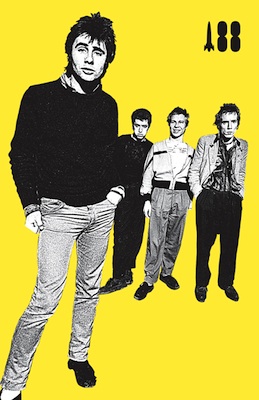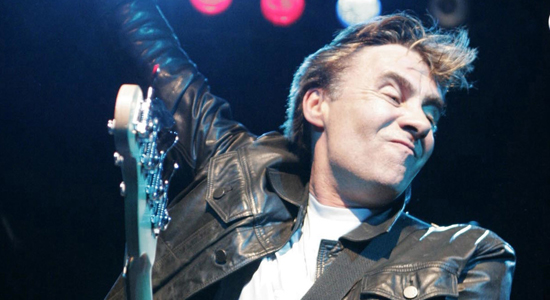The reissuing of Glen Matlock’s autobiography I Was A Teenage Sex Pistol is likely to be divisive in more than one way: certainly, for one, those booksellers on Amazon hawking barely-passable secondhand copies of the original publication for upwards of £40 and pristine volumes for £350-odd are going to find themselves a little red faced while music fans without "collector money" rub their hands together. Then, of course, there’s the real debate – the one about Matlock him self – whether the former bassist was the real creative force behind the Sex Pistols or, as Steve Jones put it, ‘a middle-class mommy’s boy’.
In this exclusive extract from the book Matlock unsurprisingly opts to defend his position in the first of the two camps, discussing his work as a songwriter for one of British music’s most iconic bands and their lesser-known relationship to a certain Swedish quartet.
A lot of people, then and now, have said we couldn’t play. The fuck we couldn’t. That was an idea that Malcolm pushed hard after I left, trumpeting away with it in The Great Rock ‘n’ Roll Swindle, and telling anyone who’d listen that he was the real Sex Pistol and he couldn’t play—so therefore being able to play was quite irrelevant. We could play well. We could set up a steady groove and keep blasting away all night as hard as life. Listen to the live bootlegs which have come out over the years and you’ll hear a lot of it is certainly accomplished. Sometimes it’s a bit noisy and something of a racket but that was the intention. You can always hear the real, conscientious, effort that went into writing a song and performing it.
Take ‘Pretty Vacant’, the only song I wrote entirely by myself. The first idea for it cam from a poster that Malcolm had brought back from the States, a small handbill for a Richard Hell Television gig with the titles of several songs scattered across it. One of the songs was ‘(The Arms of) Venus de Milo’. Another was ‘(I Belong to The) Blank Generation’. Both songs said that somewhere, something pretty fundamental was missing. As soon as I saw that I thought: That’s the kind of feeling we want to get across in our songs. Not long after that I was sitting around during a soundcheck at the Nashville. I was wondering what to do with this Blank Generation idea. It certainly summed up how we—and a lot of other people—felt at the time. There was a blank, vacant, kind of feeling going around which pervaded the scene. Glam rock was exhausted, and nothing had come along to replace it. How could I express that feeling in a distinctly Sex Pistols way?
As I was thinking this through, John was doing his soundcheck. They were testing out the stage lights at the same time and was covered with this horrible green light which looked even worse on top of his orange hair. God, I thought, he looks pretty awful. And the two words came together. Pretty awful plus blank and vacant equalled ‘Pretty Vacant’. Also, I could immediately see it as a bit of a joke on John. I could imagine him standing there with the green light all over him singing "We’re so pretty, we’re so pretty". The Blank Generation idea also linked to discussions we’d been having around the band. There was a lot of talk around that time about nihilism and Dadaism. Some of the music press stories on us stressed that aspect quite heavily. And I’d come across some it doing my reading for the twentieth-century art section of my art college foundation course. So what I was trying to do was take those kind of ideas and make them really simple. Use the idea but strip it right down to the bone. From the beginning, the important thing was to get across the idea of the band in the songs of the band. We had to turn meaning into sound.
So I wrote the lyrics to ‘Pretty Vacant’—all of which are mine, apart from a couple of lines that John later changed in the second verse. I wrote something along the lines of "If you don’t like this, up your bum, we’re going down the pub." John changed it to"Stop your cheap comments, we know we’re for real." Which is a far, far better lyric. But the crux of the song is mine. Yet, although I quickly wrote a tune of sorts, it was never quite right. What I needed was one particular musical idea which would echo the lyrical idea. Finally that rid came to me in Moonies, an upstairs bar in Charing Cross Road, across the street from the Cambridge Theatre. I was in there one lunchtime drinking my way through that week’s dole money when ABBA’s ‘SOS’ came on the jukebox.
I heard the rif on it, one simple repeated octave pattern. All I did was take that pattern and alter it slightly—putting in the fifth, to be technical. Got it, I thought. What could be simpler? I’m the Marcel Duchamp of the fretboard, creating my ready-mades. The next stage was to fit that ABBA riff to the chord sequence for the chorus. That came straight from the Small Faces’ ‘Wham Bam, Thank You Ma’am’ because it fitted so well. One not so obvious point about the song is this; it’s a very simple song in terms of construction and if you’re going to be simple, you should be as simple as you possibly can. ‘Boredom’ by the Buzzcocks is a perfect example of that. The one-note guitar solo expresses exactly what the song is about. So the simple riff is the very centre of ‘Pretty Vacant’. It established the basic idea and feeling of the song. We could have sat around playing really fiddly chords. If we’d applied ourselves in that direction, we would have been quite capable of doing it. But we didn’t, we deliberately chose to go our own way, keeping it as basic as possible.
I’m amazed no-one has yet noticed that ‘Pretty Vacant’ is borrowed from ‘SOS’. But that’s what song-writing is all about. Everything is nicked from something else. Only later, years after you’ve written the song, do you let on.

I Was A Teenage Sex Pistol is available now on Rocket 88 Books with an official launch at Rough Trade East on November 22nd


